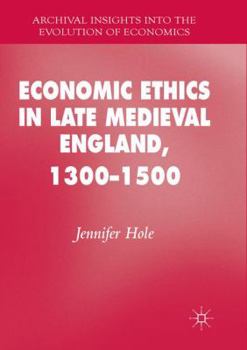Economic Ethics in Late Medieval England, 1300-1500
Select Format
Select Condition 
Book Overview
Drawing on an array of archival evidence from court records to the poems of Chaucer, this work explores how medieval thinkers understood economic activity, how their ideas were transmitted and the extent to which they were accepted. Moving beyond the impersonal operations of an economy to its ethical dimension, Hole's socio-cultural study considers not only the ideas and beliefs of theologians and philosophers, but how these influenced...
Format:Paperback
Language:English
ISBN:3319817655
ISBN13:9783319817651
Release Date:June 2018
Publisher:Palgrave MacMillan
Length:300 Pages
Weight:0.83 lbs.
Dimensions:0.7" x 5.8" x 8.3"
Customer Reviews
0 rating





